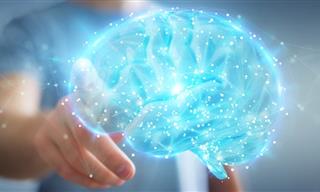It's in human nature to feel sadness. Every life is filled with ups and downs, tragedy and comedy, kindness and cruelty. It is a part and parcel of who we are and an important part of our journey. But for some people, the struggles often don’t end with the event that triggered the sadness. Nowadays, more and more people are suffering from depression and other mental ailments, at young ages also, and the explanation goes well beyond a singular circumstance, or an individual's inability to be happy or find strength. In fact, most mental health problems that people face can be understood from a purely chemical standpoint.

The brain is essentially the chemical factory of the body, producing all the hormones that keep our bodies growing and sending out all the messages to keep our limbs moving. So its only natural that in some cases, this factory might face some difficulties while doing its job. After all, we are only beings of flesh, blood, and imperfection, not machines. But those imperfections are what give us the drive, the endurance and the passion to persevere against all odds and struggle even through the toughest of times. That, and television.
With that brief moment of levity over, let’s get back to the topic at hand. What are some of the mental health problems that are now becoming more and more commonplace?
Well, there’s depression. We already covered that. There are various types of depression as well. One of the more severe ailments that some people face is Bipolar Disorder, usually marked by intense and often uncontrollable periodic mood swings and personality shifts. Anxiety and frequent panic attacks can also be extremely disruptive and can affect a person’s ability to function normally and interact with other people.
There are also a large number of people world over who suffer from memory loss, both long and short term, which can also be caused by an irregular production of chemicals in the brain (when not caused by head injuries or drugs, pharmaceuticals and other). Even addiction has been linked to irregular brain chemistry. These problems can affect people of all ages, races, geographies, and backgrounds.

What Does Brain Chemistry Mean?
So when we talk about brain chemistry, what chemicals are we talking about specifically? We are basically talking about hormones and neurotransmitters. Neurotransmitters are the messengers of the body, letting the various organs know how the brain wants them to act, through nerve cells. These neurotransmitters can be huge determinants in our emotions. The following are a few of the main hormones our brains produce that affect our emotional state:
1) Dopamine

This hormone has a very important role to play as it is the communicator between neurons and nerve cells. It is also the chemical that controls our motor function and drive. Dopamine is the hormone that keeps you motivated, active and focused on the task at hand and the world around you. Needless to say, it is a very important neurotransmitter, and lower levels of dopamine can result in depression, fatigue, and anxiety. High levels of dopamine, on the other hand, can result in addiction, largely because most addictive substances, from video games and coffee to alcohol and narcotics, are usually designed to increase dopamine levels drastically.
2) Serotonin

Also commonly known as the happy hormone, Serotonin is responsible for the joyful sensations we experience in life. Low levels of serotonin have been a major factor linked with depression. This is because problems can arise with respect to neuron inhibitors, that are in the brain to regulate the production of these hormones, and inhibit them where necessary. But in some cases, the production of serotonin can become too low as a result, which is why most anti-depressants are created with the intent to stop inhibitors from reducing the production of serotonin.
3) Melatonin

This is the hormone that helps you sleep at night. It is produced by the pineal gland located in the center of the brain. Our sleep cycles, in general, are regulated by the suprachiasmatic nucleus (SCN), a center in the hypothalamus that sends signals to other parts of the brain. On exposure to darkness, the pineal gland receives a signal from the SCN and begins to actively produce melatonin. As the melatonin levels in your bloodstream increase, you steadily become drowsier. And the internal clock of the human body is usually pretty strict, as melatonin stays in the body normally from 9 pm to 9 am. Irregular production of melatonin can result in insomnia, fatigue and even depression in cases of excessive sleeping.
4) Oxytocin

This is another hormone brought to us courtesy of the hypothalamus and with the assistance of the pituitary gland. It plays a major role in how we interact with people and react to sexual arousal, giving it the name “the cuddle hormone” or “the love hormone”. It can also affect our ability to trust and high amounts can lead to anxiety and even addictive tendencies. It also has gender-specific effects, affecting the production of testosterone in the testes, as well as playing a huge role in the process of labor, childbirth, and child-rearing.
5) Endorphin

These are the chemicals of the body produced to give you an almost morphine-like rush. That is why many athletes often experience what is called the “runner’s high”, a sense of euphoria caused by increased production of endorphins due to vigorous exercise. This hormone affects the way the human body perceives pain and can act as an analgesic and a natural pain reliever. In some cases, it even works as a sedative, allowing the body to rest after completion of a strenuous activity.
6) Adrenaline

Also known as epinephrine, this hormone is produced in the center of the adrenal glands known as the medulla. Adrenaline can also be produced by certain neurons in the central nervous system. Once in the bloodstream, it can have varying effects on different organs, usually activating the “fight or flight” instinct in the body. Adrenaline can affect the body in numerous different ways, from enlarging of the pupils to increase the heart rate and blood flow to different areas of the body. As you can guess, low levels of this hormone could make your lethargic, while too much can make your body and mind go into overdrive.
7) Acetylcholine

This is one very important neurotransmitter, and in fact, among the first neurotransmitters discovered by scientists. Found commonly in both the central and peripheral nervous systems, which makes this chemical of such vital importance is that it stimulates the contraction of our muscles. Essentially all behavior and almost all movement comes down to how this particular neurotransmitter sends across its message, and what that message is. Naturally, if this hormone is in large or short supply, it can lead to some strange and almost unexplainable behavior.
8) Gamma-Aminobutyric Acid (GABA)

This neurotransmitter plays the very important role of a neural inhibitor and regulator, reducing, where possible, the activities of nerve cells and neurons. In that way, Gamma-Aminobutyric Acid is an essential determinant of our cognitive abilities and behavior. They work to keep neurons from becoming overexcited, which could potentially reduce anxiety and panic. A low-level of this neurotransmitter can cause disorders ranging from insomnia to depression and even schizophrenia.
9) Glutamate

This non-essential amino acid is released by nearly half of all the brains, synaptic agents. But its a more local neurotransmitter that never leaves the blood-brain barrier (which is the wall designed to protect the brain). It is specifically associated with our ability to remember and learn, making it a major player in the development of the brain. Increased presence of glutamate in the human body has been linked with various ailments, like multiple sclerosis, Alzheimer’s and Parkinson;s Disease, while low levels can be associated with Obsessive Compulsive Disorder, Schizophrenia, and Autism.
10) Norepinephrine

This hormone is a variant of adrenaline and is also known as noradrenaline. Much like its counterpart, it is heavily linked with the “fight or flight” instinct of the human body. This type of neurotransmitter sends messages to the skeletal muscles of the body to increase the force of contractions, as well as contractions of the heart. It effectively prepares our body to react to a threatening situation, whatever that reaction may be.
Natural Remedies For Keeping Your Brain Chemistry Balanced
Now that we know what really goes on in our brains, and how it affects our happiness, sadness, physical behavior, energy levels, focus and so many other aspects of living and feeling, what are some of the natural remedies available that can help you self-regulate the production of these hormones in your brain?
1. Get Moving

Regularly exercising is fantastic for the body and the brain. It increases the production of endorphin in the body, making you happy and euphoric, a mood-changer right there, and gets the adrenaline pumping through your bloodstream. The increased muscle movement will strengthen you physically and mentally.
2.Appreciate the Sun

Well, even if you don’t appreciate it, just make sure you get a little of it every day. It can improve your state of mind drastically. Sunlight, when absorbed through the skin, results in an increased production of serotonin by the brain. Just fifteen minutes a day in the sun, and you’ll understand why it’s called the “feel-good” hormone.
3. Let go of Stress

Easier said than done, yes. But definitely worth working towards, because stress is closely linked to low levels of GABA and increased amounts of norepinephrine and oxytocin. Don’t worry, there are numerous great ways to cope with stress.
4. Give yourself a bedtime

Even if you don’t feel like you need to sleep, your brain definitely does. The brain produces melatonin, which will make you drowsier as the sunsets. Not only that, but the brain requires strength, energy, and fuel to produce the other hormones that make our bodies function healthily, and avoid struggling with fatigue and exhaustion.
5. Watch your diet

Most chemicals produced by the brain are also found in numerous foods, so it's important to eat carefully and healthily. Caffeine, meat, bananas, chocolate and beets can increase the production of dopamine in the body, while broccoli, brown rice, fish, nuts, and even lentils can increase the amount of GABA produced by the brain.
Click here for more articles on brain health
 Go to BabaMail
Go to BabaMail









































